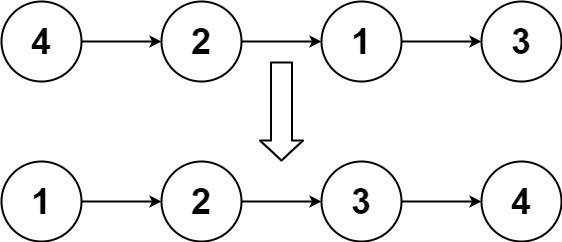Leetcode148. 排序链表
题目描述
给你链表的头结点 head ,请将其按 升序 排列并返回 排序后的链表 。
进阶:
- 你可以在
O(n log n) 时间复杂度和常数级空间复杂度下,对链表进行排序吗?
示例 1:

1
2
| 输入:head = [4,2,1,3]
输出:[1,2,3,4]
|
示例 2:

1
2
| 输入:head = [-1,5,3,4,0]
输出:[-1,0,3,4,5]
|
示例 3:
提示:
- 链表中节点的数目在范围 $[0, 5 \times 10^4] $内
- −105≤Node.val≤105
解题思路
链表的排序是一道很经典的题目,可以实现的排序算法有很多种。本道题主要实现了链表的归并排序。
链表的归并排序的思想与数组的归并排序并无二致,也可以分为递归和迭代两种方式来实现。
在具体的实现过程中主要有以下几点差别:
代码如下所示:
示例代码
迭代版:
1
2
3
4
5
6
7
8
9
10
11
12
13
14
15
16
17
18
19
20
21
22
23
24
25
26
27
28
29
30
31
32
33
34
35
36
37
38
39
40
41
42
43
44
45
46
47
48
49
50
51
52
53
54
55
56
57
58
59
60
61
62
63
64
65
66
| struct ListNode {
int val;
ListNode *next;
ListNode() : val(0), next(nullptr) {}
ListNode(int x) : val(x), next(nullptr) {}
ListNode(int x, ListNode *next) : val(x), next(next) {}
};
ListNode* mergerTwoList(ListNode* firstHead,ListNode* secondHead)
{
if(!firstHead) return secondHead;
if(!secondHead) return firstHead;
ListNode* virtualHead=new ListNode(0);
ListNode* firstPtr=firstHead;
ListNode* secondPtr=secondHead;
ListNode* curPtr=virtualHead;
while(firstPtr&&secondPtr)
{
if(firstPtr->val<secondPtr->val)
{
curPtr->next=firstPtr;
firstPtr=firstPtr->next;
curPtr=curPtr->next;
curPtr->next=nullptr;
}
else{
curPtr->next=secondPtr;
secondPtr=secondPtr->next;
curPtr=curPtr->next;
curPtr->next=nullptr;
}
}
if(firstPtr) curPtr->next=firstPtr;
if(secondPtr) curPtr->next=secondPtr;
return virtualHead->next;
}
ListNode* findMidPtr(ListNode* head)
{
if(head==nullptr||head->next==nullptr) return head;
ListNode* fastPtr=head->next->next;
ListNode* slowPtr=head;
if(fastPtr&&fastPtr->next)
{
fastPtr=fastPtr->next->next;
slowPtr=slowPtr->next;
}
return slowPtr;
}
ListNode* sortList(ListNode* head)
{
if(head==nullptr||head->next==nullptr) return head;
ListNode* midPtr=findMidPtr(head);
ListNode* rightHead=midPtr->next;
midPtr->next=nullptr;
ListNode* leftPtr=sortList(head);
ListNode* rightPtr=sortList(rightHead);
return mergerTwoList(leftPtr,rightPtr);
}
|
时间复杂度:O(nlogn)
空间复杂度:O(logn)
迭代版:
1
2
3
4
5
6
7
8
9
10
11
12
13
14
15
16
17
18
19
20
21
22
23
24
25
26
27
28
29
30
31
32
33
34
35
36
37
38
39
40
41
42
43
44
45
46
47
48
49
50
51
52
53
54
55
56
57
58
59
60
61
62
63
64
65
66
67
68
69
70
71
72
73
74
75
76
77
78
79
80
81
82
83
84
85
86
87
88
89
90
91
92
93
94
95
96
97
98
99
100
| struct ListNode {
int val;
ListNode *next;
ListNode() : val(0), next(nullptr) {}
ListNode(int x) : val(x), next(nullptr) {}
ListNode(int x, ListNode *next) : val(x), next(next) {}
};
ListNode* mergerTwoList(ListNode* firstHead,ListNode* secondHead)
{
if(!firstHead) return secondHead;
if(!secondHead) return firstHead;
ListNode* virtualHead=new ListNode(0);
ListNode* firstPtr=firstHead;
ListNode* secondPtr=secondHead;
ListNode* curPtr=virtualHead;
while(firstPtr&&secondPtr)
{
if(firstPtr->val<secondPtr->val)
{
curPtr->next=firstPtr;
firstPtr=firstPtr->next;
curPtr=curPtr->next;
curPtr->next=nullptr;
}
else{
curPtr->next=secondPtr;
secondPtr=secondPtr->next;
curPtr=curPtr->next;
curPtr->next=nullptr;
}
}
if(firstPtr) curPtr->next=firstPtr;
if(secondPtr) curPtr->next=secondPtr;
return virtualHead->next;
}
int getLength(ListNode* head)
{
int length=0;
while(head!=nullptr)
{
length++;
head=head->next;
}
return length;
}
ListNode* split(ListNode* head,int step)
{
if(head==nullptr) return head;
ListNode* cur=head;
for(int i=1;i<step&&cur->next!=nullptr;++i)
{
cur=cur->next;
}
ListNode* right=cur->next;
cur->next=nullptr;
return right;
}
ListNode* sortList(ListNode* head)
{
if(head==nullptr||head->next==nullptr) return head;
int length=getLength(head);
ListNode* virtualHead=new ListNode(-1,head);
for(int subLength=1;subLength<length;subLength*=2)
{
ListNode* pre=virtualHead;
ListNode* cur=virtualHead->next;
while(cur!=nullptr)
{
ListNode* head1=cur;
ListNode* head2=split(head1,subLength);
cur=split(head2,subLength);
ListNode* merged=mergerTwoList(head1,head2);
pre->next=merged;
while(pre->next!=nullptr)
{
pre=pre->next;
}
}
}
return virtualHead->next;
}
|
时间复杂度:O(nlogn)
空间复杂度:O(1)


